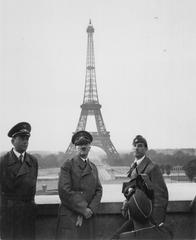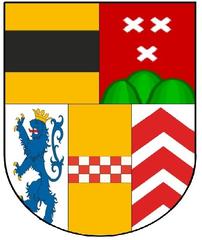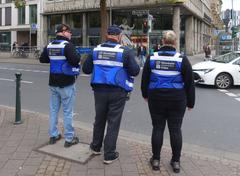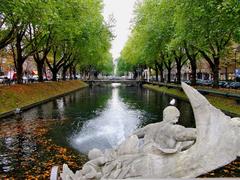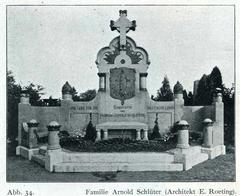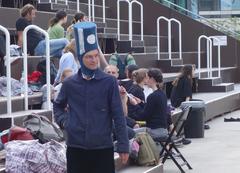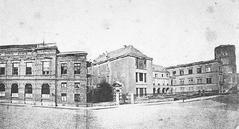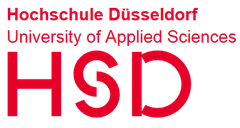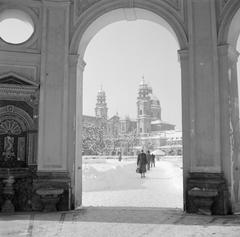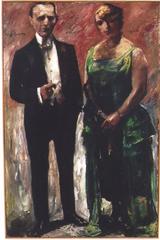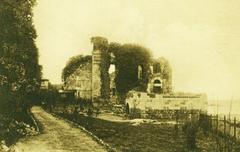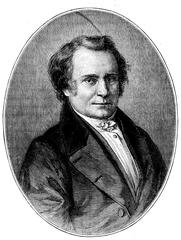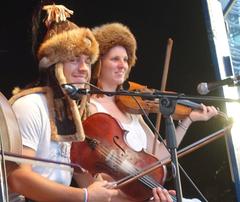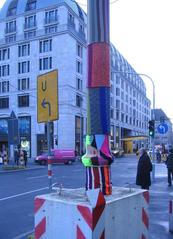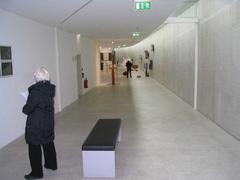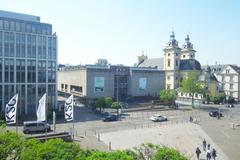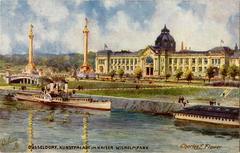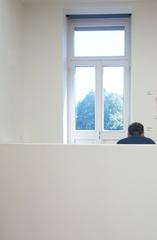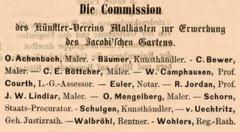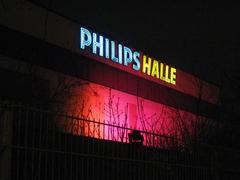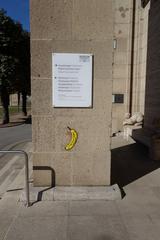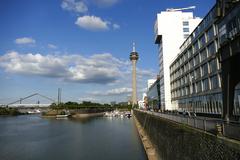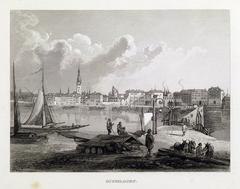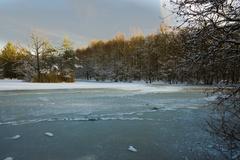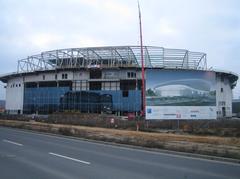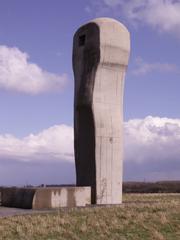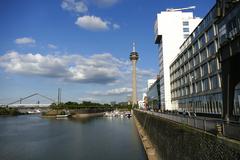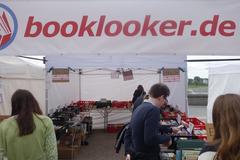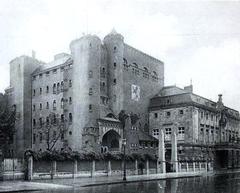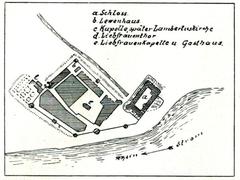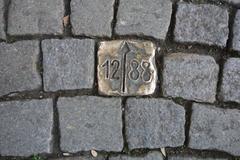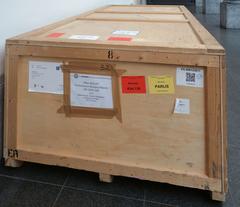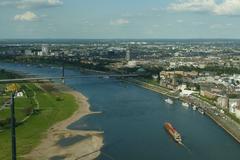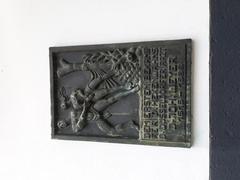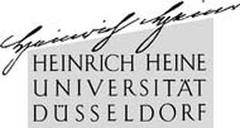
Düsseldorf-Bilk Observatory: Visiting Hours, Tickets, and Travel Guide
Date: 04/07/2025
Introduction
Nestled in Düsseldorf’s vibrant Bilk district, the Düsseldorf-Bilk Observatory (Sternwarte Düsseldorf-Bilk) is a historic site that stands as a monument to the city’s scientific and cultural legacy. Established in 1843 by the renowned physicist Johann Friedrich Benzenberg, the observatory was once a hub of astronomical research—most notably for the discovery of 24 asteroids, known as the “24 Düsseldorf planets.” While the original building was destroyed during World War II, today the site is preserved as an open-air memorial, featuring informative plaques and the preserved telescope tube, inviting visitors to reflect on the city’s pioneering contributions to astronomy.
This guide provides comprehensive information for visitors: from the observatory’s fascinating history and significance, to practical tips on visiting hours, ticketing, accessibility, tours, and nearby attractions. Whether you are an astronomy enthusiast, history buff, or curious traveler, the Düsseldorf-Bilk Observatory offers a unique window into the city’s scientific past and vibrant present (Visit Düsseldorf website; Düsseldorf city history).
Table of Contents
- Quick Visitor Information
- Historical Overview
- Visiting the Düsseldorf-Bilk Observatory: Practical Information
- What to See and Do
- Nearby Attractions and Suggested Itineraries
- Safety, Conduct, and Accessibility Services
- Sustainability and Community Engagement
- Frequently Asked Questions (FAQ)
- Summary & Key Points
- Sources
Quick Visitor Information
- Location: Near Alt St. Martin Church, Bilk district, Düsseldorf, Germany
- Opening Hours: The open-air memorial is accessible at all times. For guided tours or special events, check local listings.
- Admission: Free (no tickets required for the memorial site)
- Accessibility: Wheelchair accessible; no indoor museum on site
- Guided Tours: Occasionally available via local historical societies; see Visit Düsseldorf
Historical Overview
Founding and Early Years
The Düsseldorf-Bilk Observatory was founded in 1843 by Johann Friedrich Benzenberg, who financed and directed the construction of this private research institution near the historic Alt St. Martin church (Düsseldorf city history). The observatory was equipped with a powerful 1.8-meter focal length refracting telescope, making it a significant center for star cataloging and astronomical observation.
Asteroid Discoveries and Scientific Legacy
After Benzenberg’s death in 1846, the city of Düsseldorf acquired the observatory, appointing Franz Friedrich Ernst Brünnow as its first municipal director. However, it was under Karl Theodor Robert Luther’s leadership (1851–1890) that the observatory achieved international fame, with the discovery of 24 asteroids—minor planets that substantially advanced 19th-century astronomical research (Asteroid discoveries at Bilk). These achievements placed Düsseldorf on par with major European astronomical centers.
The Memorial Today
World War II bombings in 1943 destroyed the original observatory. Today, the preserved telescope tube and commemorative plaques stand as a memorial in front of Alt St. Martin’s west tower. The site is a poignant reminder of Düsseldorf’s contributions to scientific progress.
Visiting the Düsseldorf-Bilk Observatory: Practical Information
Location and Accessibility
The memorial is located in the Bilk district, which is easily accessible by public transport (tram, S-Bahn, and bus). The area is pedestrian-friendly and close to other landmarks, including the University of Düsseldorf.
- By Tram: Line 709 from D-Graf-Adolf-Platz U to D-Georg-Schulhoff-Platz (every 15 minutes; ~8 minutes; €2–3)
- By Bus: Line 726 from D-Poststraße to D-Bachstraße (hourly; ~13 minutes; ~€3)
- From Airport: Train from D-Flughafen Terminal S to D-Völklinger Straße S (~19 minutes); taxi (~13 minutes; €27–33)
- By Car: Parking is available but limited
- On Foot/Bicycle: 20–30 minutes from Altstadt; bike-friendly district (Rome2Rio)
Visiting Hours and Tickets
- Memorial Site: Open at all times, free admission
- Nearby Science Venues: Check individual websites for opening hours and ticket prices
Guided Tours and Special Events
- Guided Walking Tours: Offered by local historical societies and Visit Düsseldorf
- Special Events: “Night of the Stars,” anniversaries, and themed city tours—check the event calendar
Facilities and Accessibility
- Restrooms & Seating: Available nearby in shopping centers and public transport stations
- Wheelchair Access: Site and public transport are accessible
- Information Boards: Bilingual (German and English)
What to See and Do
- Commemorative Plaque & Telescope Tube: Learn about the site’s scientific history
- Photography: Capture the interplay of historical and modern architecture
- Explore Bilk District: Streets named after astronomers and celestial bodies
- Nearby Attractions:
- Rheinturm (Rhine Tower): Panoramic city views and dining (Rheinturm)
- Düsseldorf Arcaden: Shopping and dining
- University of Düsseldorf Botanical Garden: Over 6,000 plant species
- Südpark: Düsseldorf’s largest urban park
- Altstadt (Old Town): Museums, galleries, and nightlife (Germany Travel Blog)
Safety, Conduct, and Accessibility Services
- Quiet Conduct: Maintain silence during stargazing events
- Photography: Allowed without flash
- Children: Under 12 must be accompanied by adults
- Language Services: Materials and guided tours in German and English; additional language support on request
- Accessibility: Ramps, elevators, and accessible restrooms at nearby venues
Sustainability and Community Engagement
The observatory’s legacy continues through educational outreach, sustainability initiatives (e.g., energy-efficient lighting, light pollution awareness), and partnerships with schools and citizen science projects.
Frequently Asked Questions (FAQ)
Q: Can I enter the observatory building?
A: The original building was destroyed; only the outdoor memorial is accessible.
Q: Are tickets required?
A: No tickets are needed for the memorial site. Tickets may be required for special tours or nearby venues.
Q: What are the opening hours?
A: The site is open at all times.
Q: Are guided tours available?
A: Yes, check Visit Düsseldorf for schedules.
Q: Is the site wheelchair accessible?
A: Yes, the memorial and Bilk district are accessible.
Summary & Key Points
The Düsseldorf-Bilk Observatory stands as a symbol of the city’s enduring scientific spirit—from its founding by Johann Friedrich Benzenberg to the 24 asteroid discoveries of Robert Luther. While the original structure no longer exists, the memorial invites visitors to engage with Düsseldorf’s astronomical legacy. The site is freely accessible, supported by occasional guided tours, and surrounded by a district rich in history, culture, and green spaces. For the latest events, tours, and practical tips, consult the Visit Düsseldorf tourism portal and consider the Audiala app for audio guides and recommendations (Asteroid discoveries at Bilk).
Sources
- Visit Düsseldorf: Tourism, Tickets, and Attractions
- Düsseldorf city history
- Asteroid discoveries at Bilk (International Astronomical Union)
- Rome2Rio: Düsseldorf-Bilk Observatory transport info
- Trek Zone: Düsseldorf-Bilk Observatory
- Düsseldorf culture (Adventure Backpack)
- Rheinturm (Rhine Tower) Visit Information
- Visit Düsseldorf Events


